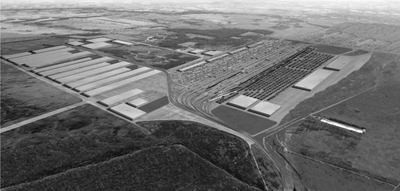John S. Gates, Jr. disucsses technology and industrial development, and his new role as Chair of the Metropolitan Planning Council Board of Governors
The Metropolitan Planning Council was proud to elect John S. Gates, Jr. as chair of our board of governors on September 13, 2002. A Chicagoan since age 10, Gates has been president and CEO of CenterPoint since its formation in 1984, and has grown it to be the largest property owner and developer — with over 30 million square feet of warehouse and industrial properties — in metropolitan Chicago.
One element of Gates' and CenterPoint's success can be attributed to an innovative vision for the region, as exemplified by the new intermodal facility CenterPoint is building on the former site of the U.S. Army Joliet Arsenal. Gates saw in that 2,200-acre former Superfund site not only a source of economic development in Joliet and the nearby Village of Elwood, but also the potential for a solution to the whole region's intermodal freight congestion problems. Partnerships with businesses and government entities will ultimately allow for creation of a profitable, high tech industrial facility bordered by the newly created 15,000-plus acre Midewin National Tallgrass Prairie.
Below Gates shares his thoughts on that project, and his vision for the Metropolitan Planning Council in the years to come.

What was the vision behind the Joliet Arsenal Intermodal Center?
Intermodal traffic is growing very rapidly — seven percent annually, some sources say, and it's likely to continue going at that kind of pace for the foreseeable future. Containers, mostly from the Pacific Rim, all come to the coasts, and what doesn't stay on the West Coast gets on a train and comes to Chicago. Chicago is the rail hub of North America, but our infrastructure hasn't been able to keep pace. It's had tremendous negative effects on gridlock in the region.
At CenterPoint, we look at ourselves as being in the problem solving business. We knew the railroads had intermodal capacity problems, and we knew the federal government had a problem with what to do with the Joliet Arsenal. By mating the two problems, you actually create solutions for everybody. The arsenal was ideal for an intermodal center ... it's adjacent to BNSF's main line in Chicago ... and 20 minutes from nine interstate highways.
At one point, the arsenal had been a huge employer — of about 10,000 people — but it suffered from a lack of economic development over the years. It was an area who's time had gone by. It was headed to being the world's largest landfill, and the community went crazy. So we came along and saw a government with a problem, and a county that didn't like the use that had evolved. Finding a parcel that meets [an intermodal facility's size requirements] in the Chicago area, with no NIMBY issues, is next to impossible. But this worked perfectly.
A University of Illinois study forecasted that the new facility will provide 8,000 permanent jobs, as well as a similar number of jobs during the course of construction, in an area that could use the economic development.

When the CenterPoint facility opens, it will be the largest intermodal container handling facility in the world, and connect the Burlington Northern Santa Fe and Union Pacific railroads, and 17 million sq. ft. of industrial space, with the Chicago region.
One of the important features of the project is technological infrastructure, can you say something about that?
Modern office buildings have a built-in fiber optic core, and capacity to add more, and they have a huge competitive advantage over older office buildings. It's the same in an industrial park. The whole supply chain is being automated, so that everything down to that water bottle you're drinking from will ultimately be created on demand. We wanted to foresee the technological needs of potential clients, so we worked with Ameritech, who built two-plus miles of fiber optic infrastructure — cement encased conduit with four PVC tubes. We now have [broadband] capacity in place for foreseeable future ... and room to grow all over the place.
What are you excited about doing with MPC?
MPC has a tremendous reputation and tremendous momentum. A challenge is to make it truly a regional organization, and get input and membership from suburban communities. There's a lot going on in MPC's core issue areas — from cargo to education funding. It's an organization who's time has really come. Its issues are the issues of the day.
And the suburban involvement is something you can bring?
I don't think getting better regional involvement is a stretch. MPC has suburban members, and very strong ties to the business community through its executive advisors ... a lot of those folks are leading suburban companies. And many of the hot planning issues of the day are suburban issues. The airport is a suburban problem. The cargo issue is largely a suburban issue — you don't get grade crossing problems much in downtown Chicago, but they're tremendous in the south suburbs.
If the Village of X is present at the creation of a policy and understands the issues and has input, the reception is very different locally, and MPC can have a great deal more impact.
There's a very receptive audience out there, and I think there's a need, especially among politicians, for an understanding that regional planning is a necessity. Most of them understand that they cannot go it alone any longer; they've got to cooperate. They shouldn't lose their autonomy and political authority, but they realize there's a need to talk to each other. MPC should initiate, facilitate and serve as a respected, apolitical resource for this regional dialogue.